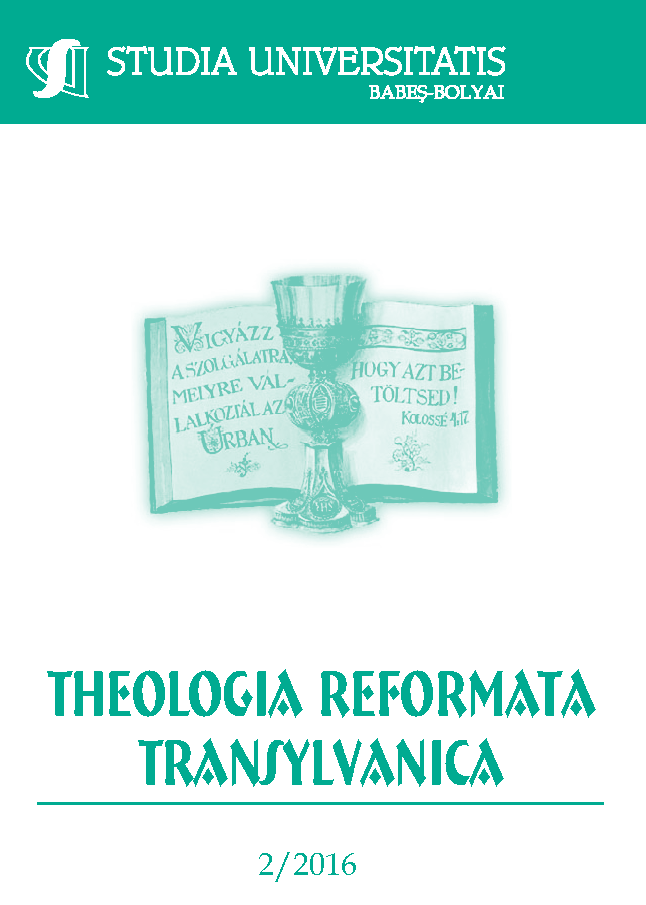A „reunió” vitája a Reformáció 300. évfordulójának küszöbén
Keywords:
union, reunion, Protestant union, union attempts, the impact of the Enlightenment on the Church.Abstract
The Dispute of the “Reunion” on the Threshold of the300ᵗʰ Anniversary of the Reformation.
In the era of Enlightenment, independent thinking became highly significant for the modern man, who has built up a world-culture, which sought to be rid of the church tutelage. In the early 19th century, Protestant churches have responded differently to the strong secularization. They realized that society has changed and the old relations have been terminated. Consequently, many church-members did social work, helping the poor, creating nursing homes, etc. By contrast, the Roman Catholic Church refused all kinds of innovative changes and contact initiations. Thus, conservatism and restoration efforts came into view in the Catholic Church. In fact, the consolidation of the old Catholic tradition by new dogmas was attempted. Both on the Catholic and the Protestant side there were rationalists and romantics, whose enthusiasm for the union reached a point, where they considered that the reunification of not only the Protestants, but of all Christian denominations was possible. These and other such efforts, which aimed at “assimilation”, strengthened especially around the tercentenary of the Reformation. Such opinions came forth on both sides that the most worthy celebration of the rupture that had occurred three hundred years ago would be if the Protestants returned into “one flock”. The attempts at a union in the early 19th century have failed; therefore those who wished a union realized that there were insurmountable obstacles preventing it. These obstacles were primarily emotional and political conflicts, which were, in fact, the seeds of doctrinal and historical barriers.
References
BALÁZS László: A felekezetek egymáshoz való viszonya 1791–1830. Különös tekintettel az egykorú nyomtatványokra. Budapest, Medoka Nyomda, 1935.
BANGHA Béla: Keresztyén unió? MSZ, 29/2, 1937.
CSÓKA Lajos: Guzmics Izidor, a keresztény egység apostola. In: Szolgálat, 45, 1982. 50-57.;
FÉLEGYHÁZY József: „Észrevételek ily czímű prédikácziók iránt: Az Evangéliomi ke-resztyén tolerantzia két Prédikátzióban előadva.” Budapest, 1824.
FILÓ Lajos: Unióvitály a hazai r.kath. és protestánsok közt 1822–27. In: Sárospataki Füzetek, 1860.
HEUSSI, Karl: Az egyháztörténet kézikönyve. Budapest, Osiris Kiadó, 2000.
KISS Z. Géza: Egy kései unitárius per a Dráva völgyében. Adalékok Járdánházi Sá-muel üldöztetéséhez. In: Somogy megye múltjából. Levéltári évkönyv 20. Kaposvár, 1989.
KOOL, Anne-Marie: Az Úr csodásan működik. I, Budapest, Harmat, 1995.
LUKÁCS Olga: Early Protestant Missionarism in Romania in the Decades Following the Revolution of 1848–1849. In: Transylvanian Review, 2. 2005.
PÁKOZDY László Márton: Uniós és reuniós törekvések Magyarországon. In: Vigília, 1972. 7.
PEAKER James I.: A megújulás teológiája. Kolozsvár, Koinónia, 2000.
RÉVÉSZ Imre: A keresztyénség története. Kolozsvár, Minerva Irodalmi és Nyomdai Műintézet, 1920.
SZABÓ Aladár: A protestantizmus és a külmisszió. Protestáns Szemle (PSZ) 1890.
SZÁNTÓ Konrád: A Katolikus Egyház története. Budapest, Ecclesia Kiadó, 1984.
SZILÁGYI Sándor: Adalék az unió-vitály történetéhez 1822-ben. In: Sárospataki Füzetek, 1861.
WALLMAN, Johannes: A pietizmus. Budapest, Kálvin Kiadó, 2000.
ZAMFIR Korinna: Katolikusok és protestánsok. Történelmi visszatekintés és teológiai párbeszéd. Stúdium, Kolozsvár, 2002.
ZOVÁNYI Jenő: A felvilágosodás története. Budapest, Genius Könyvkiadó, 1922.
ZOVÁNYI Jenő: A magyarországi protestantizmus története 1895-ig. Budapest, Attrak-tor, 2004.
ZOVÁNYI Jenő: Magyarországi protestáns egyháztörténeti lexikon, Budapest, A Ma-gyarországi Református Egyház Zsinati Irodájának Sajtóosztálya, 1977.
Downloads
Published
How to Cite
Issue
Section
License
Copyright (c) 2016 Studia Universitatis Babeș-Bolyai Theologia Reformata Transylvanica

This work is licensed under a Creative Commons Attribution-NonCommercial-NoDerivatives 4.0 International License.






